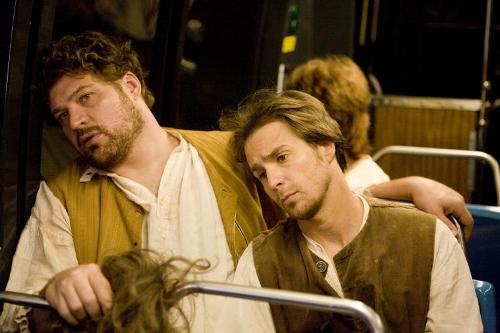Chuck Palahniuk once said in an interview that his goal as a writer was not to make books which people liked but ones which people would never forget. David Fincher made a similar statement of purpose with the opening credits in his adaptation of Palahniuk’s first book Fight Club by famously zooming from the cellular depths of Edward Norton’s brain out to the barrel of a gun. Maybe not everyone liked Fight Club but it’s certainly not a film the viewer easily forgets. Fincher’s greenish tints, short attention span editing and gratuitous use of CGI to peek inside bodies and buildings have now become the obligatory calling cards of edgy TV dramas such as CSI, but at the time the combination seemed fresh and eye catching.
Choke begins far more modestly with some standard titles over a slow pan around a support group for sex addicts, which is essentially the way Fight Club begins (chronologically that is). Sam Rockwell, in a break-though performance, plays the sex obsessed historical interpreter (he pretends to be a colonial peasant on a heritage site) who scams people out of money to pay the doctor’s bills for his ailing mother. Hi favorite scam is pretending to choke in up-scale restaurants and soliciting money from his saviours, who become tied to him by a kind of maternal instinct. His mother (Anjelica Huston in a perfect bit of casting) is a former outlaw of sorts who continually abducted the young Victor from potential foster parents. Now she can’t even recognise her son and her dementia is rapidly accelerating. A young doctor in the mental health ward (Kelly Macdonald) promises an unlikely cure and the potential for a relationship beyond the fleeting satisfaction familiar to the sex addict.
One will recognise from Fight Club the theme that modern life is so isolating that we need to invent scams and elaborate pretences just to connect with other human beings. We also, of course, use those same scams to protect ourselves from being hurt. But if the themes and some of the situations seem familiar, it becomes immediately apparent that Choke won’t employ the same relentlessly dark tone as it’s predecessor. Director / screenwriter Clark Gregg explains in the production notes that he wanted to present Choke like a perverted Romantic Comedy, subverting the genre from the inside. Unfortunately, unless you are a film critic and have a copy of said production notes, or the director was sitting next to you in the cinema nudging you when something was done ironically, this clever conceit could easily be lost on you. One could just as easily, as I initially did, see the blatant Rom-Com format not as iconoclasm but as a half measure to appease the studios who wanted the film to be easier on the palette.
This is always the danger with pastiche that if accurate enough if just becomes what it mocks. If it mocks the format too much though, you are left cold. It’s sad that it is even necessary to rely on formats. Books, or at least good books, are not as constrained by genre as much as films. A book like Choke can jump from humour to drama to trash without blinking but as a film it must become a comedy with dark overtones or a drama with comic touches. It’s strange how we have to rely on conventions to tell us that something is funny. Audiences seem to need permission to laugh in the form of upbeat music and pauses after jokes. It is amazing to sit in a cinema and hear people stifling their giggles because they think their laughter is misplaced. If it’s funny, it’s funny. Choke does not need the comedy tropes because it revels in the natural absurdity of life and relationships. The director’s impulse to make a rom com is not wrong it’s just unnecessary.
But if the director has not, in my mind, succeeded in subverting the romantic comedy format, he has succeeded in making one of the very best true romantic comedies of the year. The strength of the genre is its ability to quietly smuggle in genuine emotions, concealed under a cloak of puerile humour and cynicism. The best rom coms out flank the audience by playing to their jaded side and then tugging at their heartstrings while they are distracted.
Choke is probably the most jaded romantic comedy ever and that is why the emotions are so believable and unexpected. The goal for the romantic leads is companionship more than love and the obstacles are more psychological than external. The film’s central relationships are all unconventional but are not judged by the film as such. Even in their extremes we can all see aspects of our own behaviour in the main characters.
Choke doesn’t have the flair or the audacity of Fight Club but in many ways it is a better film because it doesn’t live or die by its style. It is also a better story. Where Fight Club was immature and cold, Choke is full of humanity and surprising wisdom. This adaptation might fail Chuck’s test by being ultimately forgettable but I, at least, really liked it.
Click the numbers bellow to see out gallery of the top 10 most adventurous book adaptations.



